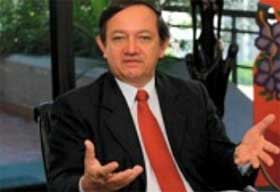
|  |  |  Americas & Beyond Americas & Beyond  
Ambassador Márquez: Venezuelan Proposal in UNASUR Seeks to Turn South America Into a Peace Zone
 Radio Nacional de Venezuela Radio Nacional de Venezuela
July 29, 2010


| | Venezuela Foreign Minister Gustavo Márquez |  |
Uribe's government supports Washington's campaign promoting intervention in Venezuela.

Turning South America into a peace zone is the ultimate goal of the proposal Venezuela is bringing to the meeting of the Council of Foreign Ministers of the Union of South American Nations (UNASUR), being held Thursday in Quito, Ecuador, said Venezuelan ambassador to Colombia, Gustavo Márquez.

Foreign Minister Nicolás Maduro has announced that he will present at the meeting a peace plan to end the civil war in the neighboring nation of Colombia, a conflict which produces consequences in the entire region.

On the program Venezuela Has Awaken (Despertó Venezuela) on Venezolana de Televisión (VTV), Ambassador Márquez denied that the Venezuelan initiative can be described as interventionist, and stressed that it is logical for the Bolivarian government to present this proposal within UNASUR given that the Colombian conflict and the serious problems which arise in that nation, such as drug trafficking, criminality and paramilitary activity, affect the entire region.

"I think it is appropriate that this be done, because peace in Colombia represents peace in Venezuela and the region", he stressed, and noted that the proposal will be an open agenda that seeks to consolidate UNASUR as a political mechanism, whose effectiveness is possible thanks to the will of each member state.

UNASUR "is the natural setting to discuss our problems and to make South America a peace zone, where diplomacy, understanding and the mechanisms for creating transparency in our relationships should prevail."

Márquez stated that there is a clash of two visions: A warlike vision reflected in the attitude of Colombia's outgoing Foreign Minister, Jaime Bermudez, who flatly rejected the proposal, and the prevailing conception in Latin America, which seeks peace, respect for human rights and the deepening of democracy.

He recalled that only negotiated solutions and peace agreements had brought about the end of decade-long conflicts in countries like El Salvador and Guatemala.

Colombia and the U.S. campaign against Venezuela

Ambassador Márquez expressed the belief that the government of Alvaro Uribe seeks to support the campaign promoted by Washington regarding alleged Venezuela protection of guerrillas and drug trafficking in order to create the conditions for an eventual intervention in Venezuela.

He noted that towards that end Bogota filed a complaint last week with the Organization of American States (OAS) on the alleged presence in Venezuela of members of the Revolutionary Armed Forces of Colombia (FARC) and the National Liberation Army (ELN), an accusation which forced President Hugo Chávez Frías to break diplomatic relations with the neighboring country.

Márquez described what happened at the OAS as a "show made in the USA", which sought to support the complaint with pictures and videos lacking in evidentiary value: "This is a new hoax designed to divert world attention from its serious problems to here where there is no intervention. We respect the sovereignty of the Colombian people and state, but this is an issue that concerns the entire region."

Márquez also pointed out that this attack on Venezuela occurs in the context of the U.S. State Department's building of a theater of war in the region, which includes the installation of military forces in Costa Rica, with 46 warships, more than 7,000 troops, two submarines and 10 aircraft. "There is no explanation for this."

"It seems to be kind of threat, a warning, a pressure they want to exert on Venezuela and other countries that are creating independent policies and are developing transformative constituent processes. That worries the empire which has been losing ground in the region and wants to recover it through dollar diplomacy, the big stick and the Monroe Doctrine", he continued.

He added to these facts the opening of naval bases in Panama, the installation of military bases in Colombia and the activation of the Fourth Fleet. "It's as if they were preparing a war zone."

He recalled that the Colombian ambassador to the OAS, Luis Hoyos, upon presenting the complaint, practically suggested that if Venezuela fails to guarantee its sovereignty by allegedly allowing the presence in its territory of Colombian irregular forces, others would do so.

"It represents the application of the doctrine of preventive war, on which strong emphasis has been placed by the Uribe government, as evidenced by the aerial bombing they carried out against Ecuador," Márquez said.

He pointed out that if the Uribe government supposedly had such accurate information about the presence of members of the FARC and the ELN in Venezuela, "Why did they not use diplomatic channels to put forward their claims?", especially considering that the Venezuelan government has always shown a great willingness to prevent the entry of foreign insurgents of any banner or type, because it absolutely defends its national sovereignty.

The Ambassador pointed out that it is expected that the government of Juan Manuel Santos will allow progress in the reconstruction of bilateral relations, and considered that there were indications of openness to dialogue both from Venezuela and from Santos himself, such that "what is necessary is to continue with that, especially under conditions of transparency, respect for sovereignty and the use of diplomacy as the means to settle differences. "

"We hope there will be respect and coexistence. We are committed to that", he said.

"We are sister nations. We may have differences but these should not lead us to conflict, as external elements seek", he added.

Márquez expressed the view that behind this campaign are economic and hegemonic interests of the empire, which refuse to accept that Venezuela has an independent policy in the management of its natural resources.

Radio Nacional de Venezuela (RNV) Translated by David Brookbank
|

 |
|  |



